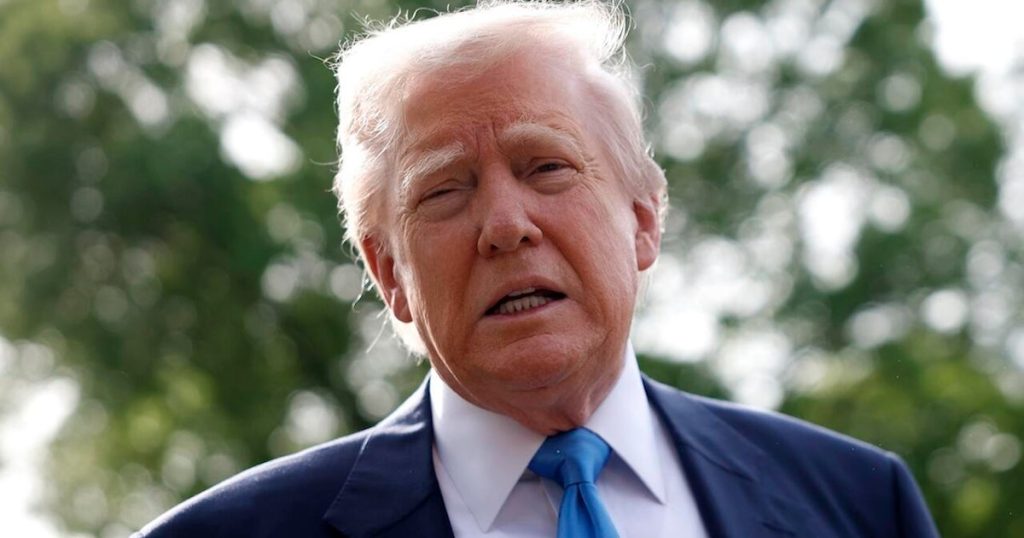In a recent interview, former President Donald Trump discussed the controversial deportation of Salvadoran national Kilmar Abrego Garcia, who was sent back to El Salvador last month amid claims of an “administrative error.” This case raises significant legal and humanitarian questions as it involves alleged gang affiliations, domestic violence accusations, and the deportation process. Trump’s remarks highlight the complexities surrounding U.S. immigration policies and individual cases caught in the system.
| Article Subheadings |
|---|
| 1) Overview of the Deportation Case |
| 2) Legal Challenges and Court Orders |
| 3) Trump’s Position on the Matter |
| 4) Allegations of Gang Affiliation |
| 5) Implications for U.S. Immigration Policy |
Overview of the Deportation Case
The case of Kilmar Abrego Garcia captures the complexities of U.S. immigration law and policy. Abrego Garcia, who entered the U.S. illegally in 2011 at the age of 16, had previously been granted a status that prohibited his removal to El Salvador due to fears of gang persecution. Nonetheless, he was deported last month, which the Trump administration described as an “administrative error.” This has raised eyebrows among immigration advocates and legal experts, particularly given the ongoing discussions about migrants’ rights and protections under U.S. law.
Legal Challenges and Court Orders
The Supreme Court recently mandated that the government must “facilitate” the return of Abrego Garcia, highlighting the ongoing legal debates surrounding deportations. This decision stemmed from a ruling by U.S. District Judge Paula Xinis, who indicated that the government had not complied with her prior orders regarding the deportation process and related procedures. The administration has faced increased scrutiny regarding how it handles cases, especially in light of claims that it has fallen short of following due process. Advocates for migrants have repeatedly called for a system that allows for individual assessments rather than blanket policies.
Trump’s Position on the Matter
In an interview aired recently, former President Trump discussed the situation, expressing that he had not directly communicated with Salvadoran President Nayib Bukele about facilitating the return of Abrego Garcia. Despite being capable of making such a call, Trump stated he refrained, claiming that his legal team advised against it. The former president characterized Abrego Garcia as an “MS-13 gang member” and raised concerns over his alleged history of domestic violence. Trump’s remarks underscore the ongoing contentiousness of the immigration debate, particularly regarding the handling of deportees with ambiguous legal statuses.
Allegations of Gang Affiliation
Abrego Garcia’s alleged involvement with the notorious MS-13 gang has been a focal point of the discussions surrounding his deportation. The Trump administration has often framed the case as part of a broader strategy to combat gang violence and maintain public safety. However, Abrego Garcia’s legal team has vehemently denied these claims, pointing out that he has never been charged with any crime related to gang activity. Adding to the complexity of the case is the fact that Abrego Garcia’s wife had previously accused him of domestic violence, yet later expressed that the situation did not escalate and she chose not to pursue legal action.
Implications for U.S. Immigration Policy
This case and others like it pose significant implications for U.S. immigration policies. The Trump administration has been keen on enforcing stricter immigration laws, often using historical statutes like the Alien Enemies Act of 1798, which allows for the removal of individuals considered a threat during wartime. However, legal experts and human rights advocates have raised concerns about the lack of due process afforded to those facing deportation under such laws. Additionally, critics argue that expedited processes often lead to injustices, negatively impacting vulnerable populations.
| No. | Key Points |
|---|---|
| 1 | Former President Trump discussed the deportation of Kilmar Abrego Garcia in a recent interview. |
| 2 | The deportation was described by the Trump administration as an “administrative error.” |
| 3 | The Supreme Court ordered the government to “facilitate” Abrego Garcia’s return. |
| 4 | Abrego Garcia’s legal team denies claims of his gang affiliation, asserting he has never been charged with a crime. |
| 5 | The case raises broader questions about due process and the handling of deportations in the U.S. |
Summary
The situation surrounding Kilmar Abrego Garcia reflects the ongoing tensions and challenges within U.S. immigration policy. With narratives surrounding public safety, individual rights, and legal frameworks commonly at odds, cases like Abrego Garcia’s serve to shine a light on the complexities of effectively governing and enforcing immigration laws. As the discourse evolves, the implications for policy reform and personal stories continue to be at the forefront of this contentious issue.
Frequently Asked Questions
Question: Who is Kilmar Abrego Garcia?
Kilmar Abrego Garcia is a Salvadoran national who was deported from the U.S. last month despite previously being granted a legal status that barred his removal to El Salvador due to fears of gang persecution.
Question: What did the Supreme Court rule regarding Abrego Garcia’s case?
The Supreme Court ruled that the government must “facilitate” Abrego Garcia’s return, highlighting challenges in the immigration process and due process concerns.
Question: How does this case impact U.S. immigration policy?
The case raises significant questions regarding the application of immigration laws, the enforcement of due process, and the treatment of individuals accused of gang affiliations without formal charges.
